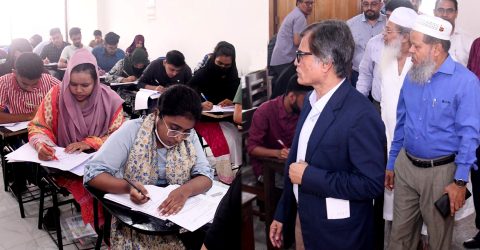Hindu law is the oldest origin of any known system of jurisprudence. Hinduism is one of the oldest religions according to many scholars.There are two schools of thoughts namely Dayabhaga and Mitakshara which are followed by the Hindu people in the matter of Inheritance. According to some Hindu jurists, law is the enforceable part of Dharma which means religion
Over the last few years,Bangladesh has been promoting the need for women’s empowerment for the purpose of poverty reduction. But over the years , Hindu law has not been reformed in Bangladesh in favor of women because Hinduism does not consider men and women equally.women suffered most in their property and inheritance rights under Hindu law as these rights are based on religion. In this regard, the daughters are the worst sufferer because their rights to ancestral property are being terminated.British enacted the Hindu women’s right to property Act 1937 opened the way for the Hindu women’s right to her deceased husband’s property but that right is also limited or known as the life interest right.
Regrettably, Bangladesh is still continuing the legacy of discrimination by allowing restricted property rights to women. No reform in the field of Hindu women’s property right has been developed
since British rule had formulated some enactments during their period .
Hindu shastric law also does not recognize dissolution of marriage. Under Hindu law marriage is a sacrament and indissoluble. But a Hindu man can marry as many as he wants. Polygamy is an extremely common thing in Hindu society and a Hindu man does not need to seek permission from his wife to marry another woman. By this practice, Hindu women of our society suffer the most . Also they cannot file a divorce against their husband because in Bangladesh there are no such statutory provisions that a Hindu woman can file a divorce. Registration of Hindu marriage is also not mandatory in Bangladesh,so Hindu male can easily marry but polyandry is strictly prohibited in Hindu law. Since no divorce is recognizable, Hindu women who want to come out of a toxic relationship are in trouble.
Since no divorce is recognizable under Hindu law, no question arises of post divorce maintenance. The only remedy a woman can get is that she can seek a separate residence. Only that time she can get maintenance from her husband but she also has to prove the valid grounds for seeking separate residence.
As no divorce is permissible under Hindu law, a Hindu woman cannot file a divorce and remarry according to her will. A hindu woman can only remarry after her husband’s death but after marriage she loses all the inheritance rights she got from her previous husband. Under Hindu widows remarriage act 1856, religious ceremonies are necessary in case of remarriage of a widow.
Adoption is permitted under Hindu law in Bangladesh. But a Hindu family can only adopt a male person and adoption of a female child is totally prohibited under Hindu law. As Bangladesh only follows the shastric Hindu law, female child adoption is not allowed and there are no such statutory provisions that a Hindu family can adopt girl child.
In this modern society, Hindu women of Bangladesh suffer the most for the existence of ancient shastric Hindu law application. Reforms of Hindu law are much needed in today’s time . After the British colonial era no major changes have been brought in Hindu law. So the property rights of Hindu women, divorce rights , maintenance and polygamy in Bangladesh is still existing. Hindu personal laws in Bangladesh are not sufficient to meet the needs of the modern times. Every state is under some obligations to ensure gender equality as it is one of the standards of human rights,so Bangladesh should also look after this Matter very carefully. When the question of reforms in overall Hindu law arises it is always ignored only on the ground of religious sentiments of Hindu people. But it should be kept in mind that reforms should be in harmony with the Hindu culture, tradition and ideology.
Tasnuva Islam Ahona
Department of Law
East West University




